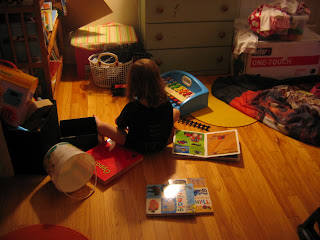
I recently watched The Fog of War: Eleven Lessons from the Life of Robert S. McNamara, which was part of our Netflix queue. My husband had seen it before, but I had somehow missed it and still wanted very much to see it.
Robert S. McNamara is a rather fascinating individual, as is his place in U.S. and world history - particularly with regard to foreign policy and military actions.
The eleven lessons in the title refers to a series of truths McNamara feels he has come to as a result of his years as Secretary of Defense; all deal with war.
The only one I struggled with was #9. McNamara states:
"In order to do good, you may have to engage in evil."
McNamara links this to the concept of responsibilities and duties as a world power, as well as national ideals or philosophies we may hold as a country. He emphasizes one must be as minimally evil as possible in one's pursuit of good, but he offers a sort of ends-justify-means argument here that smacks against some of my core beliefs about our larger responsibilities to one another as human beings regardless of geographic affiliation or national identity.
Perhaps it is incredibly simplistic to suggest one should never counter evil with evil, but it seems doing so must be inherently hypocritical and fundamentally ineffective.
A simple example. My child hits me. She is angry; wants to express that anger, so she hits. Now... I have the option to respond in a number of ways to help her learn that hitting is not an acceptable way to communicate one's needs to other people (i.e., hitting is wrong).
If I choose to hit her in response - exert my power (which is greater) over hers in order to use an authoritarian technique - then I have actually not taught her anything. I have used a corporal method, which is temporary, to exact obedience.
In other words, I can't hit my child to show my child hitting is wrong. Bandura's social learning theory backs this up, because we humans learn through observing/modeling the behavior of others (especially others who are significant in our lives). And so... my responsibility actually lies in choosing actions of response that align more firmly with my core values (e.g., compassion, kindness, mutual respect, etc.).
My guess is, if we were to peer into the hearts of most people... no matter where they might reside... they would end up being pretty similar. Just as so many religions and spiritual philosophies are, at their core, strikingly similar in their foundational tenets.
There is a quote by Shakespeare (via Marc Antony in Julius Caesar), that augments McNamara's:
"The evil that men do lives after them."
So does the good. Thus, it seems to me, McNamara's point strikes upon the very essence of building a legacy - individually, as a society, as a species. What do we want to live after us?
The reason this strikes such a clear chord with me... the reason I've been thinking about the movie and that specific lesson for about a week now... is connected to my grandfather.
Paw-Paw (my childhood name for him) served in WWII. He never, in my presence, discussed the war, his actions in it... anything. I knew he had served, but never realized where he had been stationed or what he had been doing.
And then he passed away... and then - many years later - my grandmother did as well. And suddenly we found a treasure trove of WWII artifacts he had kept and hidden away. Newspapers, medals, ceramics, pins, flags, uniforms.
And Nazi items as well. Swastikas ripped from shirts and coats, Nazi pins and buttons, a German dagger, a metal frieze of Hitler.
Evil. Elements of evil, sitting in my grandparents home, tucked in a box high up on a shelf in the downstairs bathroom - surrounded by fading contact paper and dust bunnies.
How did he get them? Who had they belonged to? Why did he keep them? What had he done to get them?
I don't think of my grandfather as an evil man, but the discovery of all those items changed my perception of him. Changed the way I thought about him, understood him. It changed his legacy.
And I have never questioned WWII - its purpose, its necessity. I question some of the aftermath of that war and the atrocities that can be laid at our feet. I question some of our tactics. And I often think about how it shapes our legacy, as a nation.
Evil exists. It has many names, many faces, many ways of being expressed in the world. And it's antithetical to our truer natures to think it should not be answered in some way. But perhaps not in its own guise, with its own face. Evil + evil just equals more evil.
May you consider your legacy today and what you leave behind in the wake of every moment.









